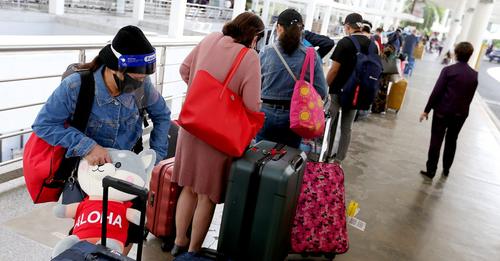Abused, unpaid OFWs in Saudi will have right to pre-terminate contracts

MANILA, Philippines – Filipino domestic workers who are abused or not paid their salaries will be allowed to pre-terminate their contracts with their employers, according to the new Standard Employment Contract (SEC) that the Philippines negotiated with Saudi Arabia.
This was one of the highlighted labor reforms that the Philippines’ Department of Migrant Workers (DMW) made with its counterpart, the Saudi Ministry of Human Resources and Social Development (MHRSD), as they prepared to lift the deployment ban of overseas Filipino workers (OFWs) to the kingdom.
On Monday, November 7, Philippine overseas labor offices in Riyadh, Jeddah, and Al-Khobar will resume accepting job orders for Filipino workers of all skills who wish to work in Saudi Arabia.
The DMW announced in September that the deployment ban on the world’s top destination for OFWs would be lifted, and that the two countries had been working together to ensure human rights would be better upheld for migrant workers.
In November 2021, the Philippines halted the processing of new contracts for domestic workers bound for Saudi Arabia. Among reasons for the ban were the unpaid wages of thousands of Filipino construction workers since 2016, and allegations of a retired Saudi general abusing several Filipino workers.
Rights-based reforms
Migrant Workers Secretary Susan “Toots” Ople proudly announced the several “firsts” that the Philippines and Saudi Arabia agreed on for OFW welfare. Some of these reforms are included in the newly-developed SEC of Filipino domestic workers bound for Saudi Arabia.
In the new SEC, a domestic worker may “immediately terminate the contract” when the worker is maltreated by the employer, when the employer violates the terms and conditions of the contract, and when the employer commits any of the following: deliberate non-payment of salary, physical or sexual molestation, or physical assault.
Under Saudi labor law, according to DMW Undersecretary Patricia Yvonne Caunan, workers can file for formal complaints against non-payment of salaries only if they have not been paid for three months.
But the Philippines brought up in bilateral talks that missing just one month’s salary would already be too difficult for Filipinos. With the help of the Saudi platform Musaned, salaries will be automated, and both countries would be able to see immediately if a worker is unpaid, even for just a month.
“The moment that our Philippine overseas labor offices don’t see the salaries come in, we can already intervene and call the Saudi recruitment agencies to follow up,” Caunan said in a mix of English and Filipino.
For the “first time,” Ople said, domestic workers and skilled workers will also have insurance covering unpaid salaries, airfare, refund of recruitment costs in the event of unfinished contracts, and other contingencies. The Saudi government will shoulder insurance for skilled workers, while Saudi employers will pay for domestic workers’ insurance.
Saudi Arabia also agreed that, like Philippine recruitment agencies, Saudi recruitment agencies will be required to hire welfare desk officers or WEDOs. “Kung wala silang welfare officer, wala silang job order (If they don’t have a welfare officer, we won’t give them job orders),” said Ople.
There will also be a “blacklist” and “whitelist” of recruitment agencies and employers that will be shared between the two countries. Abusive and non-compliant agencies will be on the blacklist. Blacklisted agencies will not be allowed to participate in recruitment and deployment of workers. But Ople said that agencies must still apply to be on the whitelist – even those that were recruiting before the deployment ban.
“Ibig sabihin nito, piling-pili lang ‘yung makakapasok sa deployment ng workers sa Saudi. Hindi porke’t 15 taon ka nang recruitment agency, ibig sabihin puwede ka na. Hindi ganoon. May bagong rules na kailangan nilang pag-aralan,” said Ople.
(This means that [agencies] that will be allowed to deploy workers to Saudi will be carefully selected. Just because you have been existing as an agency for 15 years, it does not mean you will be allowed. It’s not like that. There are new rules that they have to study.)
The whitelist and blacklist can be found on the DMW website. The agencies under “valid license” are considered the whitelist, while those “cancelled” are those on the blacklist, according to DMW Undersecretary Bernard Olalia.
The two countries will also work together to directly refer cases involving trafficking and exploitation of OFWs to the MHRSD through its anti-human trafficking department.
The migrant workers department is expecting a Saudi delegation to arrive in the next week to discuss OFW salaries, automation of recruitment processes, and the status of cases involving the unpaid salaries of Filipino construction workers.
The Philippines will also be sending three manpower augmentation teams to its three labor offices in Saudi Arabia to prepare for the anticipated deluge of new applications to work in the kingdom.
In 2019, before the COVID-19 pandemic, a total of 189,826 newly-hired OFWs were deployed to Saudi Arabia. Of these, 37,278 were domestic workers and cleaners, while 152,548 were construction workers and other occupational skills, according to DMW data. – Rappler.com
Source: Abused, unpaid OFWs in Saudi will have right to pre-terminate contracts (rappler.com)



